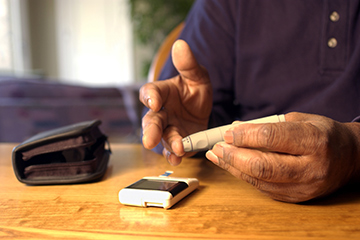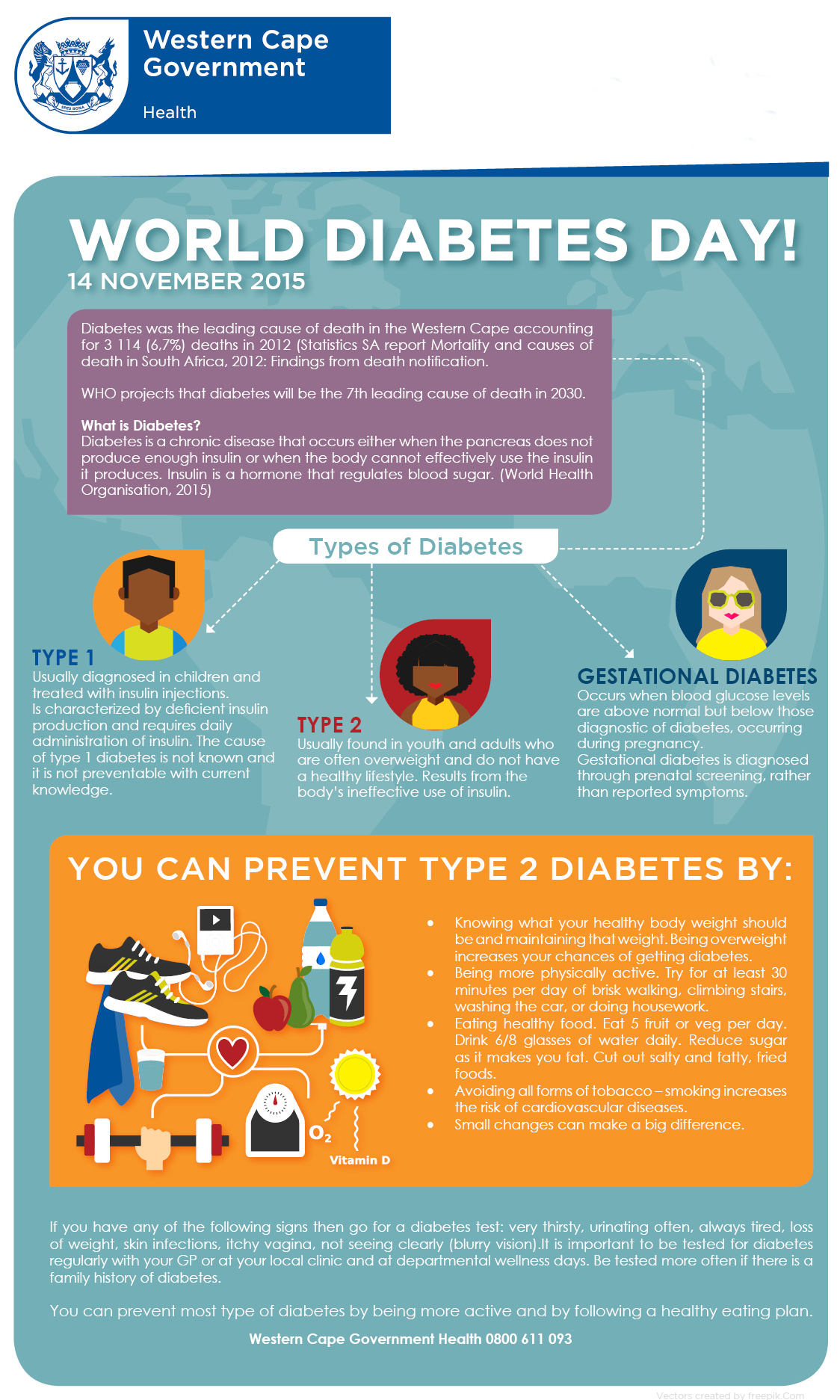World diabetes day 2015

World Diabetes Day is a campaign led by the International Diabetes Federation (IDF) and is celebrated on 14 November each year.
The day aims to raise awareness of the effects and health issues which stem from diabetes and puts the spotlight on prevention and lifestyle changes such as regular check-ups, achieving a healthy body weight and exercise.
What is diabetes?
Diabetes is a chronic disease that occurs when the pancreas is no longer able to make insulin, or when the body cannot make good use of the insulin it has.
Insulin is a hormone produced by the pancreas that transforms the glucose found in the food we eat into energy.
Not being able to produce insulin or use it effectively leads to raised glucose levels in the blood.
How serious is diabetes?
There is no such thing as ”mild” diabetes. Diabetes is always serious. If it is left untreated or is not well-managed, the high levels of blood glucose associated with diabetes can slowly damage both the fine nerves and the small and large blood vessels in the body, resulting in a variety of complications.
These include heart disease, blindness, amputation, kidney disease and erectile dysfunction or impotence. The good news is that with careful management, these complications can be delayed and even prevented, but early diagnosis is very important.
You need to know what the symptoms of diabetes are and whether you are at risk.

Symptoms of Diabetes:
•Frequent urination
•Excessive thirst
•Increased hunger
•Unusual weight loss
•Tiredness
•Lack of interest and concentration
•Blurred vision
•Frequent or recurring infections
•Cuts and bruises that are slow to heal, boils and itching skin
•Tingling and numbness in the hands or feet
•Vomiting and stomach pain (often mistaken as the flu)
These symptoms may not all present together, which is why it is important to go for regular blood glucose testing.
Types of Diabetes:
Type 1 Diabetes occurs when the pancreas stops producing insulin. It usually starts in young people under the age of 30 years, including very young children and infants, and the onset is sudden and dramatic. People who have type 1 diabetes must inject insulin to survive. Insulin dosages are carefully balanced with food intake and exercise programmes.
Type 2 Diabetes is caused when the insulin, which the pancreas produces, is either not enough or does not work properly. Approximately 85 - 90% of all people with diabetes have type 2, and many people who have this condition are undiagnosed.
Gestational Diabetes is a temporary condition that occurs during pregnancy. Both mother and child have an increased risk of developing diabetes in the future.

How do you know if you have diabetes?
Early diagnosis of diabetes is extremely important for complications to be prevented or delayed. If you are over 35 and have any of the risk factors, you should be tested every year. A simple finger-prick test at your local pharmacy or clinic can diagnose the strong likelihood that you may have diabetes within a minute.
How is diabetes treated?
Having diabetes does not mean the end of a normal, healthy life. People with diabetes need to first accept the fact that they have the condition and then learn how to manage it. This takes commitment and perseverance.
The goal of diabetes management is to bring blood glucose levels into the normal range, that is, between 4-6mmol/l. There are various aspects to good diabetes management.
They are:
•Education - Knowing about diabetes is an essential first step. All people with diabetes need to learn about their condition in order to make healthy lifestyle choices and manage their diabetes well.
healthy way of eating, which is recommended for everyone. However, what, when and how much you eat plays an important role in regulating how well your body manages blood glucose levels. It's a good idea to visit a registered dietician who will help you work out a meal plan, which is suitable to your particular lifestyle and needs.
•Exercise - Regular exercise helps your body lower blood glucose, promotes weight loss, reduces stress and enhances overall fitness and enjoyment of life.
•Weight Management - Maintaining a healthy weight is especially important in the control of type 2 diabetes. Make an appointment to see a registered dietician who will work out a meal plan to help you lose weight.
•Medication - People with type 1 diabetes require daily injections of insulin to survive. Type 2 diabetes is controlled through exercise and meal planning and may require Diabetes tablets and/or insulin to assist the body in making or using insulin more effectively.
•Lifestyle Management - Learning to reduce stress levels in daily living can help people manage their blood glucose levels. Smoking is particularly dangerous for people with diabetes.
More information
Diabetes Education Society of South Africa



